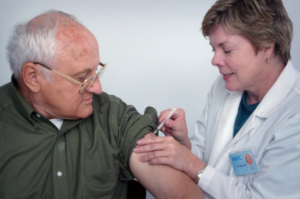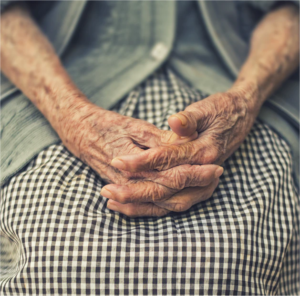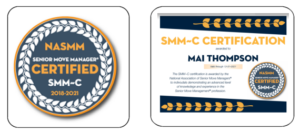Preventing Common Infections In Seniors
 We all live with infections, the common cold, the flu, bronchitis, and many others. And for most of us, those infections last for a few uncomfortable days and then they’re gone. But when a senior is attacked by infection, it’s much more serious…not only does it take longer for them to become healthy again, but because of the severe illness an infection can cause in the elderly, the American Academy of Family Physicians has stated that 33% of deaths in seniors are caused by infection.
We all live with infections, the common cold, the flu, bronchitis, and many others. And for most of us, those infections last for a few uncomfortable days and then they’re gone. But when a senior is attacked by infection, it’s much more serious…not only does it take longer for them to become healthy again, but because of the severe illness an infection can cause in the elderly, the American Academy of Family Physicians has stated that 33% of deaths in seniors are caused by infection.
If you are a caregiver for an elderly person, you must take any infection seriously as well as be alert to the types of infections that are most deadly to seniors, their symptoms and their treatments. Oftentimes the symptoms you see may seem minor and non threatening, such as increased incontinence, lack of appetite or a change in mental alertness, but it’s important to be aware of any and all changes that may be occurring.
Common Infections that are dangerous for seniors…
- Bacterial Pneumonia – Seniors are at a high risk of catching pneumonia due to decreased lung capacity, diabetes, weakened immune systems or cardiopulmonary disease.
- Symptoms include:
- Chills
- Coughing
- Fever
- Confusion
- Delirium
- Treatment is usually antibiotics. Immunization is highly recommended – especially for seniors who live in senior communities and are at risk of high exposure.
- Symptoms include:
- Influenza, commonly known as the flu – A leading cause (along with Pneumonia) of senior deaths, this infection is simply and easily transmitted by coughing and sneezing.
 Similar to Pneumonia, typical symptoms include:
Similar to Pneumonia, typical symptoms include:- Chills
- Coughing
- Fever
- A good treatment is prevention by having an annual flu vaccination.
- If someone already has contracted the flu, they may be prescribed an antiviral medication.
- Urinary Tract Infections, or UTI’s – In adults over the age of 65 yrs., Uti’s are probably the most common bacterial infection. The risk of contracting a UTI is increased with the presence of diabetes, or the use of catheters.
- Symptoms may include:
- Although not as common in the elderly, there can be pain and discomfort.
- Incontinence
- Behavioral changes
- Cognitive problems
- Treatment often includes antibiotics and increased fluids. (on a side note, it’s important for seniors to stay hydrated, which means about 8 – 8 oz glasses of water daily, which can help prevent a UTI.)
- Symptoms may include:
 Skin Infections – The skin is the body’s largest organ, and as it ages, like other organs in the body, it loses many of its protective attributes such as the ability to heal quickly or resist disease such as cellulitis, MRSA, shingles (a pressure ulcer), fungal or bacterial infections.
Skin Infections – The skin is the body’s largest organ, and as it ages, like other organs in the body, it loses many of its protective attributes such as the ability to heal quickly or resist disease such as cellulitis, MRSA, shingles (a pressure ulcer), fungal or bacterial infections.- Symptoms may include:
- Lesions
- Pain
- Itching
- Treatment for shingles, like with other infections, is vaccinations.
- For other skin infections consult with your physician who should be able to easily treat them.
- To help with prevention of skin infections, frequent and thorough hand washing is a must for both the senior and the caregiver.
- Symptoms may include:
- Gastrointestinal Infections – As the body ages, like in all other parts of the body, changes occur in the gut and in the digestive process. Gastrointestinal flora, good and necessary bacteria, lives in the gastrointestinal tract to help break down foods and aid the body in digestion and moving waste. As we age, changes occur that suppress the flora from functioning as it once did.
- Causing such symptoms as:
- Diarrhea
- Fever
- Abdominal pain
- Nausea
- Treating the infection is usually handled by using drug therapies, but for some types of GI infection, it is required to stop using the antibiotic causing the infection, so it can get tricky.
- Causing such symptoms as:
Keeping our senior’s immune systems strong is a great way to prevent these infections which can lead to further chronic health problems. In a future blog post, I’ll be talking about ways we can boost their immune systems in order to keep them as strong and as long as possible.
We are Certified Senior Move Managers recognized by our National Association of Senior Move Managers, NASSM! We are committed to serving our seniors with a high standard of ethics, best business practices and continuing education to help make whatever transition they are going through a Smooth Transition.
Managers, NASSM! We are committed to serving our seniors with a high standard of ethics, best business practices and continuing education to help make whatever transition they are going through a Smooth Transition.
Contact us to learn how we can help you and/or your family cope with a senior downsizing anywhere in the Phoenix East Valley area. We would love to serve you. 480-339-0011

Comments are closed.